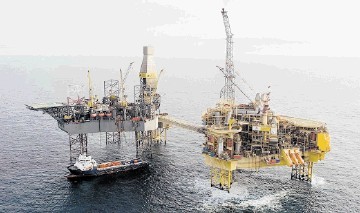
The UK Government has given offshore giant Total permission to launch an operation to plug the gas leak at its North Sea Elgin platform.
The Department of Energy and Climate Change (DECC) announced last night it had granted environmental permits which allow a “dynamic kill” mission to proceed.
The plan involves pumping mud into the G4 well from the wellhead to stop the gas release at the stricken platform, which was evacuated on March 25.
The DECC said it had carried out full environmental assessments of the operation and that the Health and Safety Executive had confirmed it has no objections to the action. A department spokesman said: “The government and Total have been working hard to ensure the Elgin gas release is dealt with as quickly and as safely as possible with minimal impact on the environment.
“The dynamic kill operation is a major step for Total and offers the quickest way to stop the release from the well. In parallel, work is under way to drill a relief well as an alternative solution. We continue to monitor the situation closely.”
A spokesman for Total could not estimate a timetable for the well kill operation last night, although an update is expected to be published by the company today. The firm said last Friday that it hoped to start pumping mud into the G4 well this week. Once the mud has blocked the gas and restored normal pressure, cement will be poured in to seal the leak, 150 miles east of Aberdeen.
Total said that, if the weather conditions were right, a semi-submersible rig called the West Phoenix could move alongside the Elgin to begin the operation.
The company has also already begun work on a back-up scheme if the West Phoenix plan fails.
Transocean’s Sedco 714 rig began drilling a relief well to plug the leak last week and the Rowan Gorilla V will also drill a well nearby. The operation is expected to take six months to complete.
The estimated volume of gas escaping from the well has reduced from seven tonnes every hour in March to just less than 2.5 tonnes.
The Scottish Government said this week that the latest tests concluded that fish taken from the North Sea close to the platform have not been contaminated.